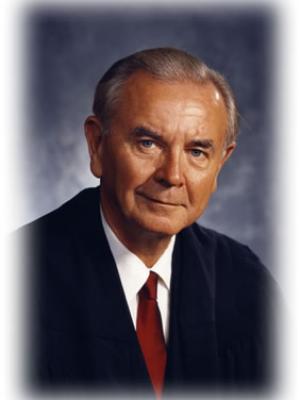
Brennan was born in 1906 and raised in Newark, New Jersey, the second of eight children of Irish immigrants. His blue-collar upbringing and public school education gave way to academic excellence and he graduated from the University of Pennsylvania and then Harvard Law School.
Brennan established his career at a Newark law firm and after a brief stint in the U.S. Army, he returned to the firm, specializing in labor law. The rising star was named to New Jersey's Superior Court in 1949 and then to the New Jersey Supreme Court three years later.
Though Brennan was considered a progressive jurist, President Eisenhower, a Republican, appointed him to the U.S. Supreme Court in 1956. Appointing a relatively young Roman Catholic from the Northeast likely was a shrewd political move by Eisenhower, who was facing re-election at the time.
However, Eisenhower's appointment would prove to have profound and lasting impact on U.S. public policy.
Brennan's appointment came in the aftermath of the landmark school desegregation case, Brown v. Board of Education. Brennan wrote several opinions upholding the principles of the Brown ruling, including Cooper v. Aaron, which forced school officials to accelerate classroom integration, and Keyes v. School District No. 1, which applied Brown to a Northern school district for the first time.
However, Brennan is best-known for two rulings: Baker v. Carr and New York Times v. Sullivan. Baker v. Carr gave federal courts - not elected officials - the power to ensure the fairness of voting districts, thus the "one person, one vote" doctrine. New York Times v. Sullivan reshaped libel law, making it more difficult for public officials to sue the media for libel.
Brennan was known as an articulate, persistent, and strategic consensus-builder who always kept his eye on the big picture. He earned the respect and affection of his conservative colleagues and often served as a bridge between the high court's two ideological factions. Warm, friendly, and charismatic, he eschewed formal titles and preferred to be called, simply, "Bill."
By the time Brennan retired in 1990, his 34-year tenure had spanned eight presidencies, during which he authored 1,360 opinions. Only five justices have served longer, and only one has authored more opinions.
Brennan died in 1997 at the age of 91. He is buried in Arlington National Cemetery next to his first wife, Marjorie, the mother of his three children, and his second wife, Mary, who he married after the death of his first wife.
Sources: Brennan Center for Justice, New York Times, Washington Post, Britannica Online Encyclopedia
